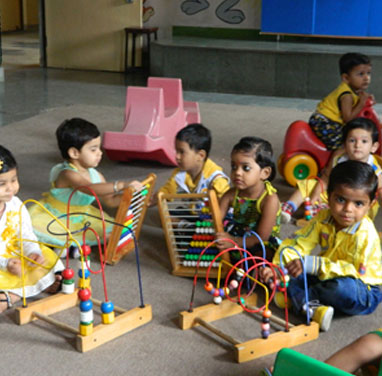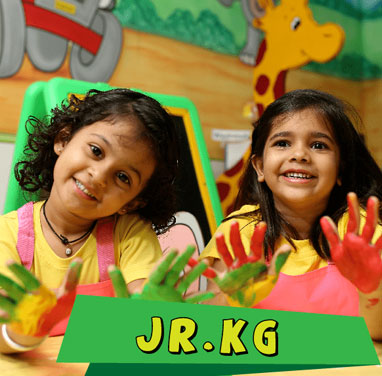Our Programs
Play Group
Age: 1.5 years to 3 years
Duration: 2 hours, 5 days a week
Facilitator–Student ratio: 1:5
As your toddler takes his first steps towards formal schooling, we are there to make sure that the transition is a pleasant and enjoyable one. At this age, our focus is on emotional and social development. For our Playgroup section, our educators employ the Play Way methodology.
The Play Way method emphasises the importance of real-world interactions and the immediate environment of the child in learning. For example, if we’re teaching children their numbers, we don’t just recite them; we write them in air or sooji, the teacher guiding the child while the child traces the numeral. To teach them colours, we have ‘colour days’ where everyone dresses in one particular colour. We conduct yoga and physical activity for their well-being. We explain the community helpers by bringing – veterinarians, firemen, traffic control cops, bakers, the neighborhood juicewallah even! Our children especially enjoy our policy of using festivals and celebrations to connect the curriculum to what the children observe and experience in their daily lives.


Nursery
Age: 2.5 years to 3.5 years
Duration: 1 year, 5 days a week
Facilitator–Student ratio: 1:5
Nursery is when the learning experience gets a boost! A child who has been through playgroup with us already knows the basics of group study – raising your hand when you want to speak, sitting in a circle around the teacher. Now it’s time for them to learn to do things by themselves.
The USP of our Nursery class is Differentiated Learning, a keystone of the IB curriculum. What Differentiated Learning means is this: all children of this age group may not be at the same level, learning-wise. Some may not be able to hold a pencil steadily yet, while others may even be writing! To give every child the attention he or she needs, we divide the class into 2 groups – younger and older children. Each child receives focussed attention to teach them the basics – holding a pencil in the tripod position (i.e. using three fingers only), the alphabet, basic colours.
A special feature of our nursery section is the morning meeting, a free-flowing exchange of ideas through conversation, designed to improve alertness and curiosity. We ask children questions such as: How was the weather today? What is the day today? Why do you eat vegetables? Do you know who the Prime Minister of our country is? General Knowledge is one of the most important yet often neglected areas of learning, which we make a point of including in our curriculum.
Junior KG
Age: 3.5 years to 4.5 years
Duration: 1 year, 5 days a week
Skills taught: Writing, Reading, Numeracy, ICT, Hindi, Visual Arts, Science, Drama, PE
Facilitator–Student Ratio: 1:6
When a child starts Junior Kindergarten, formal education can be said to have started, and the emphasis is on writing, speaking and formal mathematics. We strongly believe that expressing their own thoughts and ideas on paper motivates children to learn more. Our aim is to help each student become an Inquirer; i.e. a person who makes connections, thinks critically, works collaboratively, and develops conceptual understanding. Ultimately, it helps the child derive meaning from the world and decide upon the actions to take.
In Junior K.G., HMI kids start independent writing and Jolly Phonics (for reading). Along with understanding sounds, kids practice writing all alphabets, in both lowercase and capital. A junior kindergartener will also learn his numbers well; 1-50 orally and 1-30 in writing. In addition, they also learn to compare quantities; greater than, less than, etc.
A few new subjects are introduced at this stage: Hindi, ICT, Music, Drama, Dance, Visual and Performing Arts, Physical Education, and Science Exploration.


Senior KG
Age: 4.5 years to 5.5 years
Duration: 1 year, 5 days a week
Skills taught: Writing, Reading, Mathematics, ICT, Hindi, Visual Arts, Science, Drama, PE
Facilitator–Student Ratio: 1:6
In Senior Kindergarten, as part of our continuing effort to turn children into ‘Little Enquirers’ as mandated by the IB curriculum, we expose children to a variety of real-life experiences. For example, we do real or virtual field trips related to life skills, such as banks, bakeries, laboratories, fitness centres and more. We then ask them to reflect through writing a couple of sentences along with drawing about their experiences. We give them an object and ask them to frame a story around it – extempore! In this way, imagination is given free rein and children learn to express themselves with originality and develop a spirit of inquiry about their surroundings, which complements their formal learning – writing, reading, numeracy.
All subjects taught in Jr. K.G., i.e. Writing, Reading, Numeracy, Hindi, ICT, , Music, Drama, Dance, Visual and Performing Arts, Physical Education, and Science Exploration are taken to the next level. A Senior Kindergartener at HMI can talk about the stories, writing, pictures and models they have created, ask questions to gain information and respond to inquiries directed to them or to the class, write number names until 99, do a few simple measurements, and much more.
At the end of Kindergarten, a Happy Minds International alumnus is ready to take on first grade anywhere.
